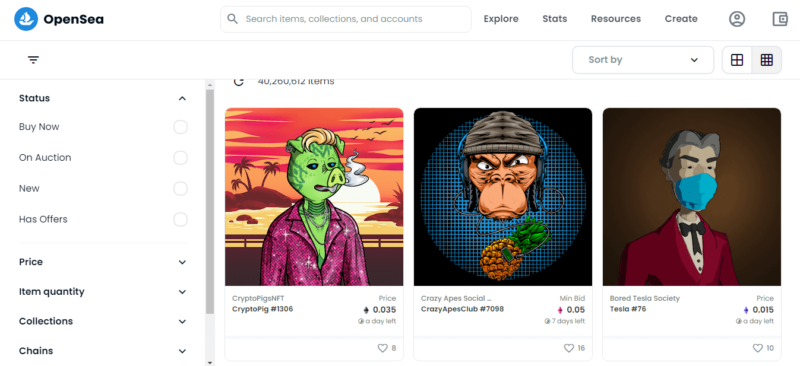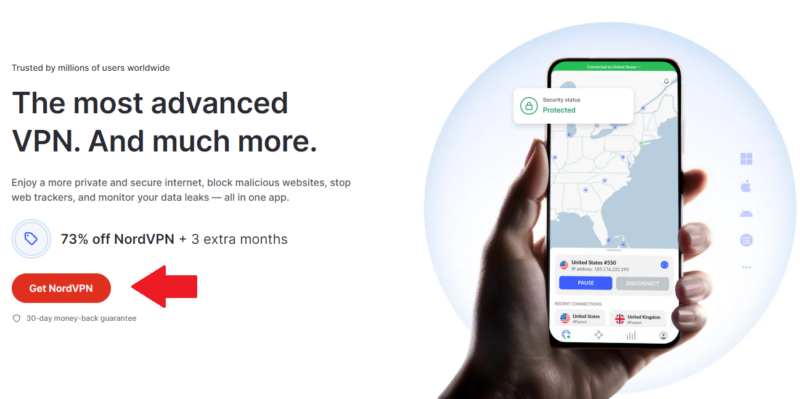The 5 Most Common NFT Scams in 2025: Fake NFT Projects, Pump & Dump Schemes & More
With the NFT boom, it’s no surprise that scammers are on the hunt for a payday. The good news is that knowing the most frequent NFT scams can help you stay a step ahead of fraudsters. Follow along as we explore the most common schemes you need to know about.
NFTs are all the rage these days because they provide a way for artists and content creators to sell their NFT collections for thousands, if not millions of dollars. In 2021 alone, NFT trades totaled a whopping $17 billion, up 21,000% from the previous year. Unfortunately, the boom has also attracted a deluge of NFT scams.
These scams can make you lose your NFTs or make them worthless in one fell swoop. You may even end up buying NFTs that will disappear before you can turn a profit.
Key Takeaways:
- As the NFT market grows, fraudsters are finding innovative ways to separate NFT creators from their hard-earned digital assets.
- The most common NFT cons are phishing, bidding scams, pump-and-dump scams and counterfeit NFTs.
- To protect your NFTs, avoid phishing sites and never share your master password with anyone or any website. In addition, always research and verify an NFT before making a purchase.
- To anonymize and encrypt your traffic, use a robust VPN service.
The difficulty with NFT scams is that they’re continuously evolving and you might not know exactly what to do to safeguard your digital assets. In this post, we’ll lift the lid on the most common NFT scams, explaining how they work and what you can do to keep your NFTs safe, such as using a VPN. Ready? Let’s jump right in.
-
10/01/2024
We enhanced the setup instructions and revised the VPN positions after thorough review.
How Do NFT Scams Work?

NFT scams usually work by stealing your account details or your private wallet key then draining your NFT account before you even get wind of the scam. The scammers use a variety of phishing cons to get these details.
If scammers can’t get NFT holders’ login details, they’ll create a fake or worthless NFT project and prey upon people’s fear of missing out and the lure of a quick buck to make them invest. Once the NFT gathers steam and investments pour in, the fraudsters vanish with the funds.
5 Most Common NFT Scams to Watch Out For
Now that we understand how NFT scams work, let’s peel apart five of the most common ones.
1. Rug-Pull Scams
A rug-pull refers to a scam where developers hype an NFT but pull out after receiving substantial funds from investors. These crooked developers often use social media to build trust and fanfare around their NFT while waiting for investor funds to pour in. Then, they shut down the entire project and vanish with the funds as soon as they have enough.
A classic case of an NFT rug-pull scam is the Frosties NFT rug-pull operated by a pair of 20-year-olds, Ethan Nguyen and Andre Llacuna. They touted their NFT with several promises, including exclusive mint passes, giveaways and dibs on a metaverse game. However, they shut down their website and social media accounts after investors poured in over $1.3 million.
2. Phishing Scams
In general, hackers use phishing to access your NFT account details. To do this, they send out fake links, often through email or popular social media channels and forums like Twitter and Discord. Once you click the link and enter your details, hackers use keylogging or spyware to access your account and compromise it.
Unsurprisingly, NFT phishing scams are on the rise. For example, in February 2022, scammers made away with nearly $1.7 million worth of NFTs in a phishing attack targeted at OpenSea — the most popular NFT platform. OpenSea had asked users to update their contract details, but scammers copied the trading platform’s email and sent NFT owners links to fraudulent websites.
3. Bidding Scams
Bidding scams often happen in the secondary market when you try to sell your NFT. When you put your NFT up for sale, scammers place the highest bid and you’d naturally want to sell it to them. However, these scammers can change the cryptocurrency used for the bidding without your knowledge.
Imagine a fraudster bids 20 Ether for your NFT art. You’ll be expecting to receive around $9,000 (per the going rate at the time of writing). However, a crafty scammer can switch out the crypto to 50 Dogecoin, which is worth less than $5.
To avoid such scams, always double-check which crypto you’re being paid with and be sure not to accept anything less than the agreed-upon bidding offer.
4. Pump-and-Dump Schemes
In a pump-and-dump NFT scam, fraudsters artificially inflate the price of an NFT by misrepresentation and spreading misleading information. Once the price goes up, they “dump” the NFT and disappear without a trace, leaving investors with worthless assets.
Usually, fraudsters use social media and celebrity endorsements to build a frenzy around an NFT. In many cases, they pour money into the NFT, ramping up the price and making it difficult for investors to ignore.
5. Plagiarized NFTs
At the very core, NFTs are about creating unique digital tokens. Unfortunately, plagiarism runs rampant on many NFT platforms. Recently, OpenSea reported that over 80% of NFTs minted using its minting tool were fake. So the chances are high that you might be buying a stolen copy of a real-world artist’s work.
Unsurprisingly, your NFT’s value will tank as soon as it becomes clear that it’s fake. That’s why you should verify an NFT before making a purchase. Also, be sure to check the seller’s history and social media profiles to confirm if the art is original and belongs to them.
Less Common NFT Scams
There are other equally dangerous but less popular scams that can also cost you your NFTs. Let’s take a look at a few of them.
1. NFT Giveaways (Airdrop Scams)
Also known as airdrop scams, NFT giveaway scams occur when fraudsters ask you to promote an NFT and sign up on their website in exchange for a free NFT. Once you’re done, they’ll send you a link requiring you to enter your wallet details to receive the prize. These NFT scammers copy your account details and use them to access your NFT collection.
2. Investor Scams
Investor scams occur when fraudsters create legitimate NFT projects and tout them as worthwhile investments. However, in reality, the projects are worthless. After stockpiling enough investor funds, the fraudsters disappear without a trace.
One example is the Evil Ape investor scam. The anonymous NFT creator disappeared with 798 Ether (ETH) worth over $2.7 million, never to be heard from again. To avoid such scams, thoroughly research the NFT creator to ensure they’re trustworthy.
3. Customer Support Impersonation
This is a kind of phishing scam where fraudsters pose as customer support agents for an NFT marketplace. They’ll typically contact you through social media channels like Discord, Telegram or Twitter with an issue regarding your account. Then, under the guise of helping you, they’ll send over a link to fake NFT marketplaces that require you to enter your private wallet keys.
As a rule of thumb, only respond to customer support requests from your legitimate NFT marketplace and their approved channels. Contact your NFT marketplace’s official customer support channels if you’re in doubt.
Security Tips: How to Avoid NFT Scams
Now that you know the most common scams in the NFT space, below are some practical tips to help you outsmart even the most cunning of fraudsters.
- Don’t click on suspicious links. You might end up giving your account details to a fraudster.
- Never share your password or seed phrase. Also, enable two-factor authentication on your account to add an extra layer of protection.
- Do your research before investing in an NFT. Always verify the NFT seller’s identity and history before making a purchase.
- Use a virtual private network (VPN) to encrypt and anonymize your NFT traffic. We recommend NordVPN, the best VPN for NFTs. Read our NordVPN review.
- Use a cold storage wallet to keep your digital assets offline.

Final Thoughts
The NFT space is plagued with an array of scams and you can lose all your digital assets if you don’t keep your eye on the ball. The most frequent scams include rug-pull, phishing, bidding, pump-and-dump schemes and counterfeit NFTs.
To secure your NFT, create strong passwords and enable two-factor authentication on your NFT accounts. Also, never share your seed phrase or click on suspicious links that require your private wallet keys. Use a VPN to encrypt and anonymize your NFT traffic. We recommend NordVPN because of its best-in-class encryption features.
Which NFT marketplaces do you use and how do you avoid scams? Have you ever been a victim of the cons we mentioned in this article? Share your thoughts with us in the comment section below, and as always, thanks for reading! be sure to read our comprehensive online scams guide.
FAQ
Do a reverse Google image search to see if the NFT has an original owner. Also, cross-check with your NFT marketplace to confirm whether the seller is verified. Be sure to check the seller’s profiles and transaction history as well. Learn more in our what are NFTs guide.
Not all NFT giveaways are legitimate. Some are used as bait to get you to part with your account details. Double-check a seller’s profile and transaction history before partaking in NFT giveaway campaigns.
Avoid clicking fishy links or entering your login credentials on any site aside from your NFT trading platform. Also, do your research before purchasing an NFT. To avoid tracking by fraudsters, use a VPN to encrypt and anonymize your traffic.
If you notice a scam on an NFT trading platform, reach out to customer support immediately and report your observations. Note that some marketplaces have reporting systems that cater to scams, so use those avenues if available.


